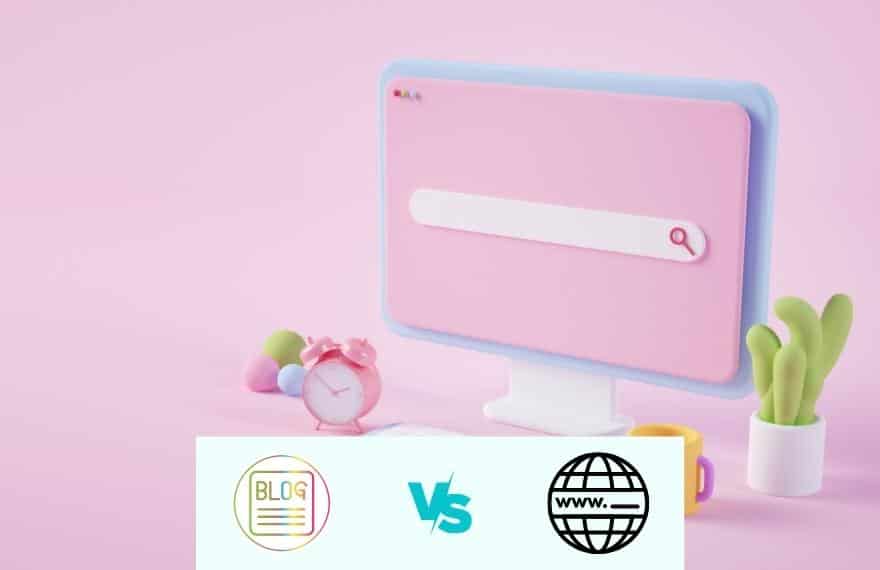Knowing the difference between a blog and a website might still be important, even at a time when the difference is just but subtle.
This is so because these two terms are often used interchangeably, when in fact they refer to two different channels, serving two distinct functions.
What is a website?
A website is a collection of web pages that are connected and accessible via a web address(domain name).
A website is made up of HTML (the code used to display the content), CSS (the code used to style the content), and JavaScript (the code used to make things happen on the page).
These three components work together to create what you see when you visit a website in your browser.
Now if these languages sound alien to you, you don’t have to worry since, with WordPress, you can build beautiful websites using drag-and-drop page builders without touching a line of code.
Different types of websites exist today, including:
- Informational business websites (corporate websites)
- Interactive websites
- eCommerce websites
- Blogs/news websites
- Portfolio websites
- Software websites
- Forums
- Wiki or database websites
- Web portals
- educational websites
- Media websites
- Social networking sites
Websites can be mapped to a domain or a subdomain. Websites that are connected under a single WordPress installation are called multi-sites. For example, a university website could run a multisite network where every faculty has their own dedicated website available via a subdomain or directory.
Examples of popular websites
| Website | Type of website |
|---|---|
| 1) Amazon.com | eCommerce |
| 2) Google.com | Search engine |
| 3) Samsung.com | Business |
| 4) Youtube.com | Media website |
| 5) Etsy.com | Marketplace |
| 6) Twitter.com | Social network |
| 7) Behance.net | Portfolio |
Why do people start a website?
There are many reasons why people start websites, and the majority of these reasons are dependent on the nature of the website.
Here are some reasons:
- To provide a hub of resources on a specific topic
- To promote a business
- To build a personal or business brand
- To take their business online
- Provide an easier way for their customers to find them online
- Websites are effective sales channels for most brands
- To provide a web-based solution to a specific problem (web tools, SaaS products)
- Sharing information about their products and services
- Promoting events like workshops or conferences
- Documenting their products to help users self-troubleshoot.
And of course, because every business has one, is good enough a reason to start a website. To be left out when it comes to business is to lose money to the competition. We don’t want that, or do we?
You now have a clear understanding of what websites are, but what makes them different from blogs? To answer this question, let’s dissect blogs in the same way.
What is a blog?
A blog is a type of website or a web page on a website that is updated regularly with new content, called blog posts or articles.
Blog posts are typically arranged in chronological order, but this isn’t always a hard rule.
I think it’s helpful to think about blogging as being like having an online journal or diary (and yes, I understand that blogging has evolved from that!).
You write posts about whatever topics interest you most at any given moment—it might be your life experiences, a given topic, or just random musings about things that strike your fancy in life.
As you publish more and more posts, the latest show up at the top of your blog page, while the oldest are pushed down the page.
Today, blogs are used to serve three main blog purposes: attract organic traffic from search engines like Google, build authority in the industry, and educate prospects and customers on topics pertinent to your industry.
When creating a website for blogging, you have three options:
a) Dedicate your entire website to blogging: In this case, your main homepage (and hence your root domain) will be your blog page.
b) Add a blog page to your website: In this case, you will have a separate page on your website, where your posts are displayed. This is a typical approach to business websites, where homepages are dedicated to providing more information about a business instead.
c) Host your blog on a sub-domain or directory: If you want to have a different installation for managing your blog, then this is the option to consider.
You might have seen blogs that have addresses like https://blog.example.com.
Hootsuite, a popular social media management tool uses this approach, where the main website is accessible via https://hootsuite.com/ while their blog is under https://blog.hootsuite.com/;

This however does mean that you have two different websites to manage, but it does help you keep things separate, especially if your main website is too ‘busy.’
Why do people start a blog?
When people decide to start a blog, they usually have one of the following reasons in mind:
- To share their knowledge or expertise.
- To share their experiences with others.
- To use a blog to promote, grow and scale their business
- To make passive income, in the long run,
- To demonstrate their industry expertise
In summing up this section on blogs, think of your blog as an additional feature or module that adds value to your website.
Examples of popular blogs
Blogs are great for sharing your life with others, as well as your knowledge, opinions, and creativity. There are millions of blogs in existence today. Here is a list of some examples of popular blogs:
- The Huffington Post — This blog is written by hundreds of contributors who write about politics and current events.
- Mashable — This blog has been around since 2005, so it’s been around long enough to become popular with readers looking for news about the latest technology products and services.
- Medium — This platform allows writers to publish their own stories on the topic they choose (which could be anything).
Other popular blogs that can tell you the difference between a website, and a blog, include:
| Blog | Type of blog |
|---|---|
| 1) Autocar.com | Automotive blog |
| 2) Techcrunch.com | Tech blog |
| 3) Therecipecritic.com | Food blog |
| 4) Lifehack.org | Personal development |
| 5) Goatsontheroad.com | Travel blog |
| 6) Ruthcrilly.com | Beauty blog |
| 7) Behance.net | Portfolio |
| 8) Chemistscorner.com | Alternative niche blog |
Blog Vs Website: Link Building
When you think about building links between these two types of content — your website vs your blog —you may wonder why it matters which type of link points where?
It’s important because Google uses these backlinks as signals to determine the quality of a web page, and hence its position in its ranking indices.
In most cases, it’s always advisable to focus your efforts on building links to your internal web pages (blog posts, pages, custom post types) as opposed to just the homepage.
How to Decide If I Need a Blog or a Website?
Now that you know the difference between a blog and a website, it’s time to decide whether you need to create a website, a blog, or both.
Build a website: if your goal is to sell products or services, build a business brand or provide more information about your company, then a website is best for that.
Build a blog: if your main reason is to blog on a given topic to monetize it later through monetization models such as display ads and affiliate marketing.
Build a website, and include a blog section: if you plan on using your blog to promote your main business website.


